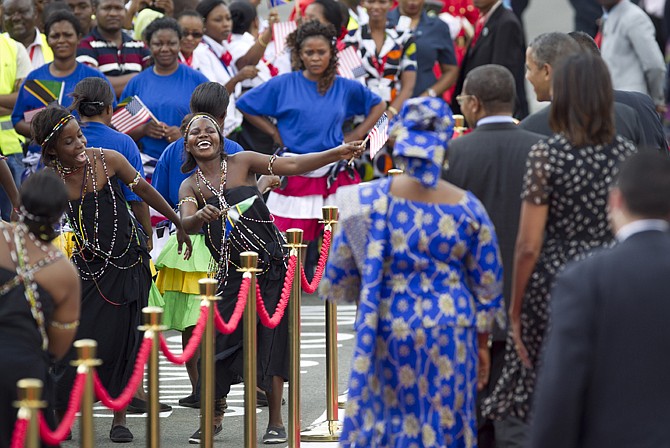DAR ES SALAAM, Tanzania (AP) - Everywhere he went in Africa, President Barack Obama was competing with history.
There was the heroic leadership of former South African President Nelson Mandela, whose deteriorating health has captured the world's attention; the legacy in Africa of Obama's predecessor, George W. Bush, who created a widely praised program to fight HIV and AIDS on the continent; and the history surrounding Obama himself, America's first black president and the son of a Kenyan man.
Against that backdrop, the initiatives Obama promoted on food security, improved health care and expanded access to electricity appeared to pale in comparison.
The president at times seemed to be trying to will the traveling press corps and the American public back home to grasp the importance of the ventures. He took jabs at the U.S. media for only covering poverty or war in Africa and made a rare on-the-record appearance before reporters on Air Force One to give an extra boost to his program for reducing hunger.
"I know that millet and maize and fertilizer doesn't always make for sexy copy," Obama said during an event in Dakar, Senegal, last week. "If the American people knew the kind of work that was being done as a consequence of their generosity and their efforts, I think they'd be really proud."
The president's frustration underscored the challenges he faced during his three-country trip, which wrapped up Tuesday in Tanzania. While his Africa policies have the potential to improve the lives of millions of people on the continent, he lacks a signature initiative like Bush's anti-AIDS program, the President's Emergency Plan for AIDS Relief. But with deep family ties to the continent and inevitable comparisons to Mandela's racial barrier-breaking, the expectations for him among Africans remain exceedingly high.
"Your success is our success. Your failure, whether you like it or not, is our failure," Archbishop Desmond Tutu told Obama during his weekend stop in South Africa.
Perhaps resigned to those high expectations and historic comparisons, Obama at times embraced them during his most significant travel to Africa since taking office.
Despite his policy differences with Bush, Obama repeatedly praised the former president's work combating HIV and AIDS, while also reminding audiences that his administration has increased the number of people benefitting from the PEPFAR program. During a news conference in Tanzania, Obama said Bush deserved "enormous credit" for saving lives in Africa and called PEPFAR one of the former president's "crowning achievements."
And when a scheduling coincidence put both Obama and Bush in Dar es Salaam on Tuesday for separate trips, the two leaders made a rare joint appearance on foreign soil, laying a wreath at a memorial for victims of the 1998 U.S. Embassy bombing in Tanzania.

